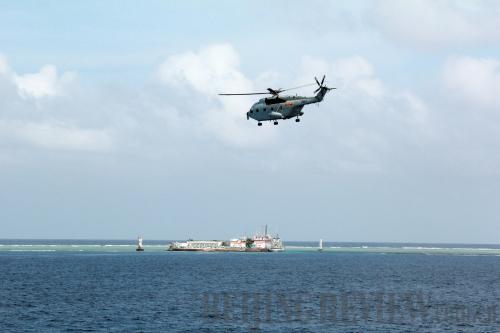|
 |
|
PATROL MISSION: A helicopter belonging to a Chinese naval fleet flies near the Nansha Archipelago in the South China Sea on January 25 (XINHUA) |

Last year, the Philippines instituted arbitral proceedings against China over maritime disputes in the South China Sea. The case appeared to have entered a new phase when Manila submitted a 4,000-page memorial filing to the arbitral tribunal on March 30.
The latest move of the Philippines, in truth, is merely the starting point for resolving the issue of whether the tribunal has jurisdiction over the arbitration case. In accordance with Article 25 of the Rules of Procedure adopted by the arbitral tribunal, if China does not appear before the tribunal, the tribunal shall invite written arguments from the Philippines on, or pose questions regarding, specific issues which it considers have not been canvassed or have been inadequately canvassed in the pleadings submitted by the Philippines. The Philippines shall make a supplemental written submission within three months, which shall be communicated to China for comments. The latter's comments will then be submitted within three months of the communication. Therefore, whether the case will finally be accepted and heard by the tribunal is still far from certain.
In response to the move, the Chinese Foreign Ministry said China does not accept the Philippines' submission of the disputes for international arbitration. "On issues concerning disputes over sovereignty of islands and reefs and delimitation of maritime boundaries, China has all along adhered to settling disputes through direct negotiations with countries concerned," said a ministry spokesman.
Nine-dash line
Under Article 298 of the UN Convention on the Law of the Sea (UNCLOS), China declared that it does not accept compulsory procedures relating to sea boundary delimitations in 2006. But the Philippines insisted that the arbitral tribunal have jurisdiction over the claims the country has asserted in the belief that its claims do not fall within the excepted category of disputes. In these circumstances, pursuant to Article 9 of Annex VII to the UNCLOS, the arbitral tribunal must demonstrate not only that it has jurisdiction over the disputes but also that the Philippines' claims are well founded in fact and law before making its award.
Though Philippines' arbitral proceedings against China are carefully packaged, they come down to disputes concerning maritime delimitations involving the concurrent consideration of unsettled sovereignty disputes over insular land territory—issues that are not covered by the UNCLOS. The Philippines doubted the legitimacy of the "nine-dash line" claimed by China in the South China Sea, and asserted South China Sea maritime disputes should be judged by the UNCLOS. But the fact is, under the principle of "non-retroactivity of treaties" enshrined in the Vienna Convention on the Law of Treaties adopted in 1969, the UNCLOS, which came into force in 1994, cannot deny China's "U-shape line" published almost half a century ago.
Moreover, since the Chinese Government has so far not made a clear interpretation of the nine-dash line, the logic behind the Philippines' accusation that the line does not conform to the UNCLOS is questionable. Currently, there are several different interpretations over the nine-dash line within China's academic circles. The Philippine side may ask China to give an official explanation before making its comments. However, Manila chose to distort China's claim, saying China has claimed the sovereignty of the whole South China Sea and made that the precondition for negotiations.
China has reiterated it has sovereignty over the South China Sea islands and their adjacent waters, but never claimed sovereignty over all waters within the nine-dash line. For instance, in a letter to UN Secretary General Ban Ki-moon in May 2009, the Chinese Government stated that "China has indisputable sovereignty over the islands in the South China Sea and their adjacent waters, and enjoys sovereign rights and jurisdiction over the relevant waters as well as the seabed and subsoil thereof." From a legal perspective, while having sovereignty over its internal waters and territorial waters, a country can enjoy sovereign rights and jurisdiction over its exclusive economic zone (EEZ) and continental shelf. Therefore, "adjacent waters" in the letter should be interpreted as territorial waters, whereas "relevant waters as well as the seabed and subsoil thereof" refer to China's EEZ and continental shelf.
|
